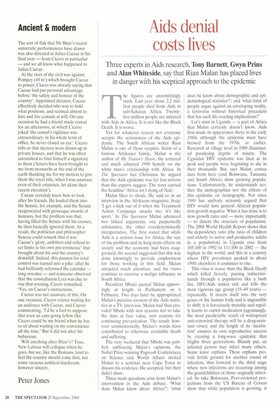Ancient & modern
The sort of flak that Mr Blair's recent autocratic performances have drawn was also directed at Julius Caesar in his final year — from Cicero in particular — and we all know what happened to Julius Caesar.
At the start of the civil war against Pompey (49 BO which brought Caesar to power, Cicero was already saying that Caesar had put personal advantage before the safety and honour of the country'. Appointed dictator, Caesar effectively decided who was to hold what positions, and seemed almost to hire and fire consuls at will. On one occasion he had a friend made consul for an afternoon, at which Cicero joked the consul's vigilance was extraordinary: in his whole term of office, he never closed an eye'. Cicero tells us that decrees were drawn up in private houses, and that he was often astonished to find himself a signatory to them (letters have been brought to me from monarchs at the end of the earth thanking me for my motion to give them the royal title, when I was unaware even of their existence, let alone their recent elevation.).
Caesar certainly knew how to look after his friends. He loaded them into the Senate, for example, and the Senate reciprocated with grotesque awards of honours, but the problem was that, having filled the Senate with his cronies, he then basically ignored them. As a result, the politician and philosopher Seneca could remark that it was Caesar's 'glory, ambition and refusal to set limits to his own pre-eminence' that brought about his and the country's downfall. Indeed, this passion for total control was turned into a joke: after he had brilliantly reformed the calendar — long overdue — and someone observed that the constellation Lyra was due to rise that evening, Cicero remarked, 'Yes, on Caesar's instructions.'
Caesar was not unaware of this. On one occasion, Cicero relates waiting for an audience with Caesar, and Caesar commenting, 'I'd be a fool to suppose that even an easy-going fellow like Cicero could be my friend when he has to sit about waiting on my convenience all the time.' But it did not alter his behaviour.
Will anything alter Blair's? True, New Labour will collapse when he goes, but we, like the Romans, tend to feel the country should come first, not some vacuous political daydream, however sincere.
Peter Jones


























































































 Previous page
Previous page